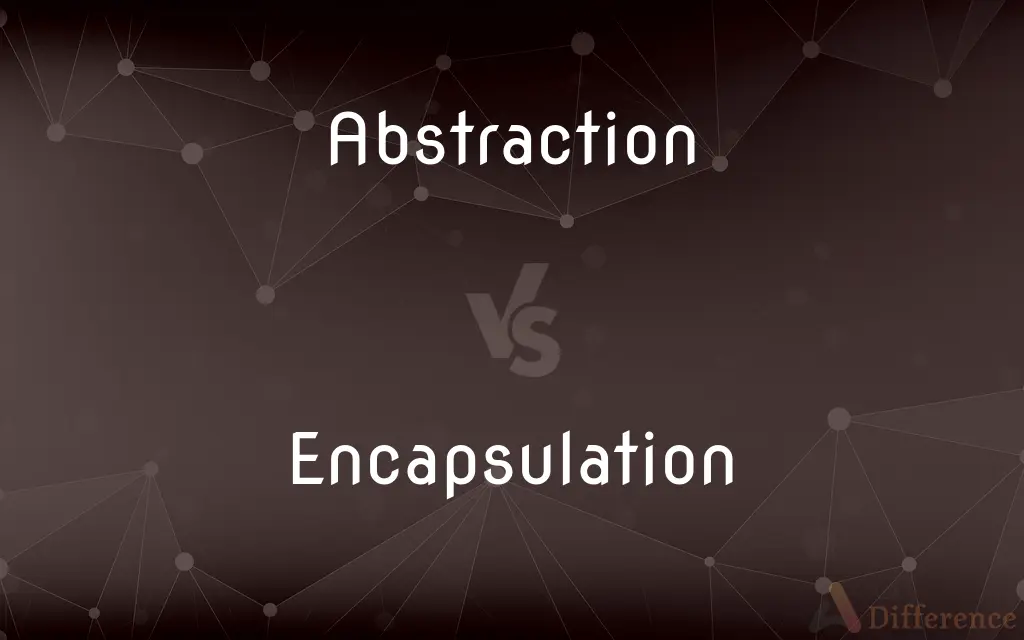Abstraction vs. Encapsulation — What's the Difference?
By Tayyaba Rehman — Published on October 10, 2023
Abstraction is simplifying complex reality by modeling classes appropriate to the problem, and working at the most relevant level of inheritance; encapsulation is hiding the internal states and require all interaction to be performed through an interface.

Difference Between Abstraction and Encapsulation
Table of Contents
ADVERTISEMENT
Key Differences
Abstraction, in computer science, refers to the concept of simplifying complex systems, hiding unnecessary details to focus only on relevant high-level features. It is about conceptualizing and modeling, enabling us to understand and manage complexity. Encapsulation, on the other hand, is about concealing the internal details of objects and revealing only what is necessary. It is a mechanism to restrict direct access to some of the object's components and can prevent unintended interference and misuse.
Abstraction allows us to create a simplified representation of an object, focusing only on its essential characteristics and behavior, and omitting the complex details. This abstraction process allows for clearer, more understandable, and manageable code. Conversely, encapsulation is ensuring that the object's internal state is hidden, exposing only what is necessary through a well-defined interface. It’s a protective barrier that keeps the data safe within the object and prevents outside code from directly accessing it.
Abstraction can be seen as a design philosophy, focusing on creating simplified, relevant models of more complex entities, reducing cognitive load. It allows us to handle and reason about complex systems at a high level, without getting bogged down by details. Encapsulation, meanwhile, is more of a technique, providing a clear structure and helping in maintaining the integrity of the system by preventing external components from interacting with the internal state other than through specified methods.
In object-oriented programming, abstraction is fundamental in creating class hierarchies and defining objects at various levels of detail, enabling polymorphism and inheritance. It is a way to manage and reduce complexity by working at the most relevant level of inheritance. Encapsulation, in contrast, is about creating a clear boundary around objects, defining a strict interaction protocol, and protecting the object’s internal state from external interference, ensuring data integrity and security.
Comparison Chart
Definition
Simplification of complex systems by modeling classes
Hiding the internal states and requiring interaction through an interface
ADVERTISEMENT
Focus
Simplifying and modeling essential characteristics and behavior
Protecting and restricting access to object’s components
Purpose
Managing and reducing complexity, clearer understanding
Maintaining integrity of the system, preventing unintended interference
Usage
Design philosophy to create relevant models
Technique to create a clear structure around objects
Process
Conceptualizing and omitting unnecessary details
Concealing internal details, exposing necessary components through interface
Compare with Definitions
Abstraction
Abstraction involves conceptualizing and modeling classes to manage complexity.
Through abstraction, complex systems are broken down into simpler, more manageable components.
Encapsulation
Encapsulation restricts direct access to some of an object’s components.
Through encapsulation, internal components are shielded from external access and manipulation.
Abstraction
Abstraction is a design philosophy focusing on creating simplified, relevant models.
Abstraction allows programmers to handle complex systems at high-level, omitting intricate details.
Encapsulation
Encapsulation is a technique to maintain the security of the system’s data.
Effective encapsulation avoids data corruption by restricting access to internal states of objects.
Abstraction
Abstraction enables clearer understanding by omitting unnecessary details.
The abstraction of data structures provides a simplified view, hiding the complicated inner workings.
Encapsulation
Encapsulation is the mechanism of hiding internal object states and requiring interaction through an interface.
Encapsulation in object-oriented programming ensures data integrity by preventing unauthorized access.
Abstraction
Abstraction in its main sense is a conceptual process where general rules and concepts are derived from the usage and classification of specific examples, literal ("real" or "concrete") signifiers, first principles, or other methods. "An abstraction" is the outcome of this process—a concept that acts as a common noun for all subordinate concepts, and connects any related concepts as a group, field, or category.Conceptual abstractions may be formed by filtering the information content of a concept or an observable phenomenon, selecting only the aspects which are relevant for a particular subjectively valued purpose.
Encapsulation
Encapsulation provides a protective barrier around objects.
Encapsulation allows for a well-defined structure, maintaining the integrity of the system’s components.
Abstraction
The act of abstracting or the state of having been abstracted.
Encapsulation
To encase in or as if in a capsule.
Abstraction
An abstract concept, idea, or term.
Encapsulation
To express in a brief summary; epitomize
Headlines that encapsulate the news.
Abstraction
An abstract quality.
Encapsulation
To become encapsulated.
Abstraction
Preoccupation; absent-mindedness.
Encapsulation
The act of enclosing in a capsule; the growth of a membrane around (any part) so as to enclose it in a capsule.
Abstraction
An abstract work of art.
Encapsulation
Grouping together an object’s ‘state’ (its data) and the operations that may alter or interrogate it (its methods).
Abstraction
The act of abstracting, separating, withdrawing, or taking away; withdrawal; the state of being taken away.
Encapsulation
(networking) The process of arranging data into packets that can be transmitted using a given protocol.
Abstraction
(euphemistic) The taking surreptitiously for one's own use part of the property of another; purloining.
Encapsulation
The act of inclosing in a capsule; the growth of a membrane around (any part) so as to inclose it in a capsule.
Abstraction
(engineering) Removal of water from a river, lake, or aquifer.
Encapsulation
The condition of being enclosed (as in a capsule);
The encapsulation of tendons in membranous sheaths
Abstraction
A separation from worldly objects; a recluse life; the withdrawal from one's senses.
A hermit's abstraction
Encapsulation
The process of enclosing (as in a capsule)
Abstraction
The act of focusing on one characteristic of an object rather than the object as a whole group of characteristics; the act of separating said qualities from the object or ideas.
Abstraction is necessary for the classification of things into genera and species.
Encapsulation
Encapsulation is about concealing object’s details and revealing only what’s necessary.
Proper encapsulation protects data within an object from unintended interference.
Abstraction
Any characteristic of an individual object when that characteristic has been separated from the object and is contemplated alone as a quality having independent existence.
Abstraction
A member of an idealized subgroup when contemplated according to the abstracted quality which defines the subgroup.
Abstraction
The act of comparing commonality between distinct objects and organizing using those similarities; the act of generalizing characteristics; the product of said generalization.
Abstraction
An idea or notion of an abstract or theoretical nature.
To fight for mere abstractions.
Abstraction
Absence or absorption of mind; inattention to present objects; preoccupation.
Abstraction
(art) An abstract creation, or piece of art; qualities of artwork that are free from representational aspects.
Abstraction
(chemistry) A separation of volatile parts by the act of distillation.
Abstraction
An idea of an idealistic, unrealistic or visionary nature.
Abstraction
The result of mentally abstracting an idea; the product of any mental process involving a synthesis of: separation, despecification, generalization, and ideation in any of a number of combinations.
Abstraction
(geology) The merging of two river valleys by the larger of the two deepening and widening so much so, as to assimilate the smaller.
Abstraction
(computing) Any generalization technique that ignores or hides details to capture some kind of commonality between different instances for the purpose of controlling the intellectual complexity of engineered systems, particularly software systems.
Abstraction
(computing) Any intellectual construct produced through the technique of abstraction.
Abstraction
The act of abstracting, separating, or withdrawing, or the state of being withdrawn; withdrawal.
A wrongful abstraction of wealth from certain members of the community.
Abstraction
The act process of leaving out of consideration one or more properties of a complex object so as to attend to others; analysis. Thus, when the mind considers the form of a tree by itself, or the color of the leaves as separate from their size or figure, the act is called abstraction. So, also, when it considers whiteness, softness, virtue, existence, as separate from any particular objects.
Abstraction is no positive act: it is simply the negative of attention.
Abstraction
An idea or notion of an abstract, or theoretical nature; as, to fight for mere abstractions.
Abstraction
A separation from worldly objects; a recluse life; as, a hermit's abstraction.
Abstraction
Absence or absorption of mind; inattention to present objects.
Abstraction
The taking surreptitiously for one's own use part of the property of another; purloining.
Abstraction
A separation of volatile parts by the act of distillation.
Abstraction
A concept or idea not associated with any specific instance;
He loved her only in the abstract--not in person
Abstraction
The act of withdrawing or removing something
Abstraction
The process of formulating general concepts by abstracting common properties of instances
Abstraction
An abstract painting
Abstraction
Preoccupation with something to the exclusion of all else
Abstraction
A general concept formed by extracting common features from specific examples
Abstraction
Abstraction is the process of simplifying complex reality by focusing on essential features.
Abstraction in software design allows developers to reduce programming complexity.
Abstraction
Abstraction in OOP involves working at the most relevant level of inheritance.
Effective use of abstraction in object-oriented programming enables enhanced polymorphism and inheritance.
Common Curiosities
How is abstraction used in programming?
In programming, abstraction is used to create simplified, high-level models of complex systems, reducing cognitive load and enhancing manageability.
Is abstraction about hiding details?
Yes, abstraction involves hiding unnecessary, complex details to create simplified models focusing on essential features.
What is the purpose of abstraction?
Abstraction simplifies complex systems by focusing on essential features, allowing clearer understanding and management of complexity.
Can abstraction reduce complexity?
Absolutely, abstraction is fundamental for reducing and managing complexity by allowing focus on high-level, relevant features of a system.
Is abstraction relevant in software design?
Indeed, abstraction is pivotal in software design for creating relevant, manageable models and reducing the complexity of systems.
Can encapsulation lead to better system structure?
Certainly, encapsulation provides clear structure and boundaries around objects, ensuring better organized and more maintainable systems.
Is encapsulation only about data protection?
While data protection is a key aspect, encapsulation also structures and organizes code, defining clear interaction protocols.
Can encapsulation protect data?
Yes, encapsulation protects data by restricting direct access to internal object components, preventing unintended interference.
What does encapsulation achieve?
Encapsulation maintains system integrity by hiding internal object states and allowing interaction only through specified interfaces.
Why is encapsulation important in OOP?
In OOP, encapsulation is crucial for maintaining object integrity, security, and preventing external components from causing data corruption.
Does encapsulation involve hiding?
Yes, encapsulation involves hiding the internal details of objects, exposing only what is necessary through a well-defined interface.
Can abstraction help in problem-solving?
Yes, abstraction aids in problem-solving by allowing focus on the essential aspects, simplifying complex problems into manageable parts.
Can abstraction and encapsulation be used together?
Absolutely, using abstraction to simplify and encapsulation to protect enhances software design, making it more comprehensible and secure.
Does abstraction involve modeling?
Yes, abstraction involves conceptualizing and modeling to create simplified representations of complex entities.
Can encapsulation be bypassed?
Ideally no, but poorly implemented encapsulation or intentional bypass mechanisms can potentially allow access to internal states.
Share Your Discovery

Previous Comparison
Bearer Cheque vs. Order Cheque
Next Comparison
Authorized vs. PermittedAuthor Spotlight
Written by
Tayyaba RehmanTayyaba Rehman is a distinguished writer, currently serving as a primary contributor to askdifference.com. As a researcher in semantics and etymology, Tayyaba's passion for the complexity of languages and their distinctions has found a perfect home on the platform. Tayyaba delves into the intricacies of language, distinguishing between commonly confused words and phrases, thereby providing clarity for readers worldwide.
















































